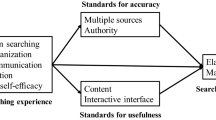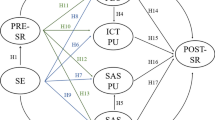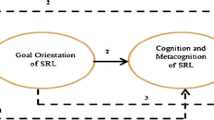Abstract
Epistemic beliefs have been considered as important components of the self-regulatory model; however, their relationships with self-regulated learning processes in the Internet context need further research. The main purpose of this study was to examine the relationships between Internet-specific epistemic belief dimensions and self-regulated learning activities while using the Internet for academic information searching. A total of 758 university students were sampled in this study. Through factor analyses, four dimensions of Internet-specific epistemic beliefs were identified, labeled as certainty of Internet-based knowledge, simplicity of Internet-based knowledge, source of Internet-based knowledge, and justification for Internet-based knowing. Factor analyses also revealed two dimensions of self-regulated learning while using the Internet for academic searching, namely preparatory self-regulated learning (i.e., task definition as well as goal setting and planning) and enactment self-regulated learning (i.e., controlling, monitoring, and reflecting). The results of the structural relationship analysis indicated that the preparatory phase of self-regulated learning positively correlated with Internet-specific epistemic beliefs relating to justification for Internet-based knowing, and was also negatively associated with two other dimensions of Internet-specific epistemic beliefs regarding simplicity of Internet-based knowledge and source of Internet-based knowledge. In addition, preparatory self-regulated learning mediated the relationships between these three dimensions of Internet-specific epistemic beliefs and the enactment phase of self-regulated learning.



Similar content being viewed by others
References
Alexander, P. A. (1995). Superimposing a situation-specific and domain-specific perspective on an account of self-regulated learning. Educational Psychologist, 30(4), 189–193. doi:10.1207/s15326985ep3004_3.
Alexander, P. A., Dinsmore, D. L., Parkinson, M. M., & Winters, F. I. (2011). Self-regulated learning in academic domains. In B. J. Zimmerman & D. H. Schunk (Eds.), Handbook of self-regulation of learning and performance (pp. 393–407). NY: Routledge.
Azevedo, R. (2005). Using hypermedia as a metacognitive tool for enhancing student learning? The role of self-regulated learning. Educational Psychologist, 40(4), 199–209. doi:10.1207/s15326985ep4004_2.
Azevedo, R. (2009). Theoretical, conceptual, methodological, and instructional issues in research on metacognition and self-regulated learning: a discussion. Metacognition and Learning, 4(1), 87–95. doi:10.1007/s11409-009-9035-7.
Azevedo, R., Moos, D. C., Johnson, A. M., & Chauncey, A. D. (2010). Measuring cognitive and metacognitive regulatory processes during hypermedia learning: issues and challenges. Educational Psychologist, 45(4), 210–223. doi:10.1080/00461520.2010.515934.
Bagozzi, R. P., & Yi, Y. (1988). On the evaluation of structural equation models. Journal of the Academy of Marketing Science, 16(1), 74–94. doi:10.1007/BF02723327.
Bandalos, D. L., & Finney, S. J. (2010). Factor analysis: Exploratory and confirmatory. In G. R. Hancock & R. O. Mueller (Eds.), The reviewer's guide to quantitative methods in the social sciences (pp. 93–114). NY: Routledge.
Biddix, J. P., Chung, C. J., & Park, H. W. (2011). The Internet and higher education convenience or credibility? A study of college student online research behaviors. The Internet and Higher Education, 14(3), 175–182. doi:10.1016/j.iheduc.2011.01.003.
Boekaerts, M. (1995). Self-regulated learning: bridging the gap between metacognitive and metamotivation theories. Educational Psychologist, 30(4), 195–200. doi:10.1207/s15326985ep3004_4.
Bollen, K. A. (1989). Structural equations with latent variables. NY: Wiley.
Bråten, I. (2008). Personal epistemology, understanding of multiple texts, and learning within Internet technologies. In M. S. Khine (Ed.), Knowing, knowledge and beliefs: Epistemological studies across diverse cultures (pp. 351–376). NY: Springer.
Bråten, I., & Strømsø, H. I. (2005). The relationship between epistemological beliefs, implicit theories of intelligence, and self-regulated learning among Norwegian postsecondary students. British Journal of Educational Psychology, 75(4), 539–565. doi:10.1348/000709905X25067.
Bråten, I., & Strømsø, H. I. (2006). Epistemological beliefs, interest, and gender as predictors of Internet-based learning activities. Computers in Human Behavior, 22(6), 1027–1042. doi:10.1016/j.chb.2004.03.026.
Bråten, I., Strømsø, H. I., & Samuelstuen, M. S. (2005). The relationship between Internet-specific epistemological beliefs and learning within Internet technologies. Journal of Educational Computing Research, 33(2), 141–171. doi:10.2190/E763-X0LN-6NMF-CB86.
Bråten, I., Strømsø, H. I., & Samuelstuen, M. S. (2008). Are sophisticated students always better? The role of topic-specific personal epistemology in the understanding of multiple expository texts. Contemporary Educational Psychology, 33(4), 814–840. doi:10.1016/j.cedpsych.2008.02.001.
Bromme, R., Pieschl, S., & Stahl, E. (2010). Epistemological beliefs are standards for adaptive learning: a functional theory about epistemological beliefs and metacognition. Metacognition and Learning, 5(1), 7–26. doi:10.1007/s11409-009-9053-5.
Buehl, M. M., & Alexander, P. A. (2001). Beliefs about academic knowledge. Educational Psychology Review, 13(4), 385–418. doi:10.1023/A:1011917914756.
Buehl, M. M., Alexander, P. A., & Murphy, P. K. (2002). Beliefs about schooled knowledge: domain specific or domain general? Contemporary Educational Psychology, 27(3), 415–449. doi:10.1006/ceps.2001.1103.
Cheng, K. H., Liang, J. C., & Tsai, C. C. (2013). University students’ online academic help seeking: the role of self-regulation and information commitments. The Internet and Higher Education, 16, 70–77. doi:10.1016/j.iheduc.2012.02.002.
Cleary, T. J., Callan, G. L., & Zimmerman, B. J. (2012). Assessing self-regulation as a cyclical, context-specific phenomenon: overview and analysis of SRL microanalytic protocols. Education Research International, 2012, 1–19. doi:10.1155/2012/428639.
Deng, F., Chen, D. T., Tsai, C. C., & Chai, C. S. (2011). Students’ views of the nature of science: a critical review of research. Science Education, 95(6), 961–999. doi:10.1002/sce.20460.
Elby, A., & Hammer, D. (2001). On the substance of a sophisticated epistemology. Science Education, 85(5), 554–567. doi:10.1002/sce.1023.
Greene, J. A., & Azevedo, R. (2010). The measurement of learners’ self-regulated cognitive and metacognitive processes while using computer-based learning environments. Educational Psychologist, 45(4), 203–209. doi:10.1080/00461520.2010.515935.
Greene, J. A., Muis, K. R., & Pieschl, S. (2010). The role of epistemic beliefs in students’ self-regulated learning with computer-based learning environments: conceptual and methodological issues. Educational Psychologist, 45(4), 245–257. doi:10.1080/00461520.2010.515932.
Hadwin, A. F., Winne, P. H., Stockley, D. B., Nesbit, J. C., & Woszczyna, C. (2001). Context moderates students’ self-reports about how they study. Journal of Educational Psychology, 93(3), 477–487. doi:10.1037/0022-0663.93.3.477.
Hair, J. F., Black, W. C., Babin, B. J., Anderson, R. E., & Tatham, R. L. (2006). Multivariate data analysis (6th ed.). NJ: Prentice-Hall.
Hartley, K., & Bendixen, L. D. (2001). Educational research in the internet age: examining the role of individual characteristics. Educational Researcher, 30(9), 22–26. doi:10.3102/0013189X030009022.
Hofer, B. K. (1994). Epistemological beliefs and first-year college students: Motivation and cognition in different instructional contexts. Paper presented at the annual meeting of the American Psychological Association, Los Angeles.
Hofer, B. K. (2000). Dimensionality and disciplinary differences in personal epistemology. Contemporary Educational Psychology, 25, 378–405. doi:10.1006/ceps.1999.1026.
Hofer, B. K. (2001). Personal epistemology research: implications for learning and teaching. Educational Psychology Review, 13(4), 353–383. doi:10.1023/A:1011965830686.
Hofer, B. K. (2004). Epistemological understanding as a metacognitive process: thinking aloud during online searching. Educational Psychologist, 39(1), 43–55. doi:10.1207/s15326985ep3901_5.
Hofer, B. K., & Pintrich, P. R. (1997). The development of epistemological theories: beliefs about knowledge and knowing and their relation to learning. Review of Educational Research, 67(1), 88–140. doi:10.3102/00346543067001088.
Hofer, B. K., & Sinatra, G. M. (2010). Epistemology, metacognition, and self-regulation: musings on an emerging field. Metacognition and Learning, 5(1), 113–120. doi:10.1007/s11409-009-9051-7.
Kammerer, Y., & Gerjets, P. (2012). Effects of search interface and Internet-specific epistemic beliefs on source evaluations during Web search for medical information: an eye-tracking study. Behaviour & Information Technology, 31(1), 83–97. doi:10.1080/0144929X.2011.599040.
Lee, S. W. Y., & Tsai, C. C. (2011). Students’ perception of collaboration, self-regulated learning, and information seeking in the context of Internet-based learning and traditional learning. Computers in Human Behavior, 27(2), 905–914. doi:10.1016/j.chb.2010.11.016.
Lin, C. C., & Tsai, C. C. (2008). Exploring the structural relationships between high school students’ scientific epistemological views and their utilization of information commitments toward online science information. International Journal of Science Education, 30(15), 2001–2022. doi:10.1080/09500690701613733.
MacKinnon, D. P., Lockwood, C. M., Hoffman, J. M., West, S. G., & Sheets, V. (2002). A comparison of methods to test mediation and other intervening variable effects. Psychological Methods, 7(1), 83–104. doi:10.1037//1082-989X.7.1.83.
MacKinnon, D. P., Fairchild, A. J., & Fritz, M. S. (2007). Mediation analysis. Annual Review of Psychology, 58(1), 593–614. doi:10.1146/annurev.psych.58.110405.085542.
Mason, L., & Boldrin, A. (2008). Epistemic metacognition in the context of information searching on the Web. In M. S. Khine (Ed.), Knowing, knowledge and beliefs: Epistemological studies across diverse cultures (pp. 377–404). NY: Springer.
Mason, L., Boldrin, A., & Ariasi, N. (2010a). Epistemic metacognition in context: evaluating and learning online information. Metacognition and Learning, 5(1), 67–90. doi:10.1007/s11409-009-9048-2.
Mason, L., Boldrin, A., & Ariasi, N. (2010b). Searching the Web to learn about a controversial topic: are students epistemically active? Instructional Science, 38(6), 607–633. doi:10.1007/s11251-008-9089-y.
Mason, L., Ariasi, N., & Boldrin, A. (2011). Epistemic beliefs in action: spontaneous reflections about knowledge and knowing during online information searching and their influence on learning. Learning and Instruction, 21(1), 137–151. doi:10.1016/j.learninstruc.2010.01.001.
Metzger, M. J., Flanagin, A. J., & Zwarun, L. (2003). College student Web use, perceptions of information credibility, and verification behavior. Computers & Education, 41(3), 271–290. doi:10.1016/S0360-1315(03)00049-6.
Muis, K. R. (2007). The role of epistemic beliefs in self-regulated learning. Educational Psychologist, 42(3), 173–190. doi:10.1080/00461520701416306.
Muis, K. R. (2008). Epistemic profiles and self-regulated learning: examining relations in the context of mathematics problem solving. Contemporary Educational Psychology, 33(2), 177–208. doi:10.1016/j.cedpsych.2006.10.012.
Muis, K. R., & Franco, G. M. (2009). Epistemic beliefs: setting the standards for self-regulated learning. Contemporary Educational Psychology, 34(4), 306–318. doi:10.1016/j.cedpsych.2009.06.005.
Muis, K. R., & Franco, G. M. (2010). Epistemic profiles and metacognition: support for the consistency hypothesis. Metacognition and Learning, 5(1), 27–45. doi:10.1007/s11409-009-9041-9.
Muis, K. R., Bendixen, L. D., & Haerle, F. C. (2006). Domain-generality and domain-specificity in personal epistemology research: philosophical and empirical reflections in the development of a theoretical framework. Educational Psychology Review, 18(1), 3–54. doi:10.1007/s10648-006-9003-6.
Muis, K. R., Kendeou, P., & Franco, G. M. (2011). Consistent results with the consistency hypothesis? The effects of epistemic beliefs on metacognitive processing. Metacognition and Learning, 6(1), 45–63. doi:10.1007/s11409-010-9066-0.
Paulhus, D. L., & Vazire, S. (2007). The self-report method. In R. W. Robins, R. C. Fraley, & R. F. Krueger (Eds.), Handbook of research methods in personality psychology (pp. 224–239). NY: Guilford Press.
Pieschl, S., Stahl, E., & Bromme, R. (2008). Epistemological beliefs and self-regulated learning with hypertext. Metacognition and Learning, 3(1), 17–37. doi:10.1007/s11409-007-9008-7.
Pintrich, P. R. (2000). The role of goal orientation in self-regulated learning. In M. Boekaerts, P. R. Pintrich, & M. Zeidner (Eds.), Handbook of self-regulation (pp. 451–502). CA: Academic Press.
Pintrich, P. R. (2002). Future challenges and directions for theory and research on personal epistemology. In B. K. Hofer & P. R. Pintrich (Eds.), Personal epistemology: The psychology of beliefs about knowledge and knowing (pp. 389–414). NJ: Lawrence Erlbaum Associates.
Pintrich, P. R. (2004). A conceptual framework for assessing motivation and self-regulated learning in college students. Educational Psychology Review, 16(4), 385–407. doi:10.1007/s10648-004-0006-x.
Pintrich, P. R., Wolters, C. A., & Baxter, G. P. (2000). Assessing metacognition and self-regulated learning. In G. Schraw & J. C. Impara (Eds.), Issues in the measurement of metacognition (pp. 43–97). NE: Buros Institute of Mental Measurements.
Raines-Eudy, R. (2000). Using structural equation modeling to test for differential reliability and validity: an empirical demonstration. Structural Equation Modeling, 7(1), 124–141. doi:10.1207/S15328007SEM0701_07.
Richter, T., & Schmid, S. (2010). Epistemological beliefs and epistemic strategies in self-regulated learning. Metacognition and Learning, 5(1), 47–65. doi:10.1007/s11409-009-9038-4.
Schommer, M. (1990). Effects of beliefs about the nature of knowledge on comprehension. Journal of Educational Psychology, 82(3), 498–504. doi:10.1037/0022-0663.82.3.498.
Schommer, M. (1993). Epistemological development and academic performance among secondary students. Journal of Educational Psychology, 85(3), 406–411. doi:10.1037/0022-0663.85.3.406.
Strømsø, H. I., & Bråten, I. (2010). The role of personal epistemology in the self-regulation of internet-based learning. Metacognition and Learning, 5(1), 91–111. doi:10.1007/s11409-009-9043-7.
Tsai, C. C. (2004). Beyond cognitive and metacognitive tools: the use of Internet as an “epistemological” tool for instruction. British Journal of Educational Technology, 35(5), 525–536. doi:10.1111/j.0007-1013.2004.00411.x.
Tsai, M. J. (2009). Online Information Searching Strategy Inventory (OISSI): a quick version and a complete version. Computers & Education, 53(2), 473–483. doi:10.1016/j.compedu.2009.03.006.
Tsai, C. C., & Chuang, S. C. (2005). The correlation between epistemological beliefs and preferences toward Internet-based learning environments. British Journal of Educational Technology, 36(1), 97–100. doi:10.1111/j.1467-8535.2004.00442.x.
Tsai, M. J., & Tsai, C. C. (2003). Information searching strategies in Web-based science learning: the role of internet self-efficacy. Innovations in Education and Teaching International, 40(1), 43–50. doi:10.1080/1355800032000038822.
Tsai, C. C., Ho, H. N. J., Liang, J. C., & Lin, H. M. (2011a). Scientific epistemic beliefs, conceptions of learning science and self-efficacy of learning science among high school students. Learning and Instruction, 21(6), 757–769. doi:10.1016/j.learninstruc.2011.05.002.
Tsai, P. S., Tsai, C. C., & Hwang, G. J. (2011b). The correlates of Taiwan teachers’ epistemological beliefs concerning Internet environments, online search strategies, and search outcomes. The Internet and Higher Education, 14(1), 54–63. doi:10.1016/j.iheduc.2010.03.003.
Tu, Y. W., Shih, M., & Tsai, C. C. (2008). Eighth graders’ web searching strategies and outcomes: the role of task types, web experiences and epistemological beliefs. Computers & Education, 51(3), 1142–1153. doi:10.1016/j.compedu.2007.11.003.
Winne, P. H. (1995). Inherent details in self-regulated learning. Educational Psychologist, 30(4), 173–187. doi:10.1207/s15326985ep3004_2.
Winne, P. H. (2010). Improving measurements of self-regulated learning. Educational Psychologist, 45(4), 267–276. doi:10.1080/00461520.2010.517150.
Winne, P. H., & Hadwin, A. (1998). Studying as self-regulated learning. In D. Hacker, J. Dunlosky, & A. Graesser (Eds.), Metacognition in educational theory and practice (pp. 277–304). NJ: Erlbaum.
Winne, P. H., & Perry, N. E. (2000). Measuring self-regulated learning. In M. Boekaerts, P. R. Pintrich, & M. Zeidner (Eds.), Handbook of self-regulation (pp. 531–566). CA: Academic.
Zhu, Y. Q., Chen, L. Y., Chen, H. G., & Chern, C. C. (2011). How does Internet information seeking help academic performance? The moderating and mediating roles of academic self-efficacy. Computers & Education, 57(4), 2476–2484. doi:10.1016/j.compedu.2011.07.006.
Zimmerman, B. J. (1990). Self-regulated learning and academic achievement: an overview. Educational Psychologist, 25(1), 3–17. doi:10.1207/s15326985ep2501_2.
Zimmerman, B. J. (2000). Attaining self-regulation: A social cognitive perspective. In M. Boekaerts, P. R. Pintrich, & M. Zeidner (Eds.), Handbook of self-regulation (pp. 13–39). CA: Academic.
Zimmerman, B. J., & Schunk, D. H. (2004). Self-regulating intellectual processes and outcome: A social cognitive perspective. In D. Y. Dai & R. J. Sternberg (Eds.), Motivation, emotion and cognition: Integrative perspectives on intellectual functioning and development (pp. 323–349). NJ: Lawrence Erlbaum.
Acknowledgement
This study was supported by the National Science Council, Taiwan, under grant number NSC-99-2511-S-011-005-MY3, NSC-99-2511-S-011-008-MY3 and NSC-100-2511-S-011-004-MY3.
Author information
Authors and Affiliations
Corresponding author
Appendices
Appendix A
Appendix B
Appendix C
Rights and permissions
About this article
Cite this article
Chiu, YL., Liang, JC. & Tsai, CC. Internet-specific epistemic beliefs and self-regulated learning in online academic information searching. Metacognition Learning 8, 235–260 (2013). https://doi.org/10.1007/s11409-013-9103-x
Received:
Accepted:
Published:
Issue Date:
DOI: https://doi.org/10.1007/s11409-013-9103-x




